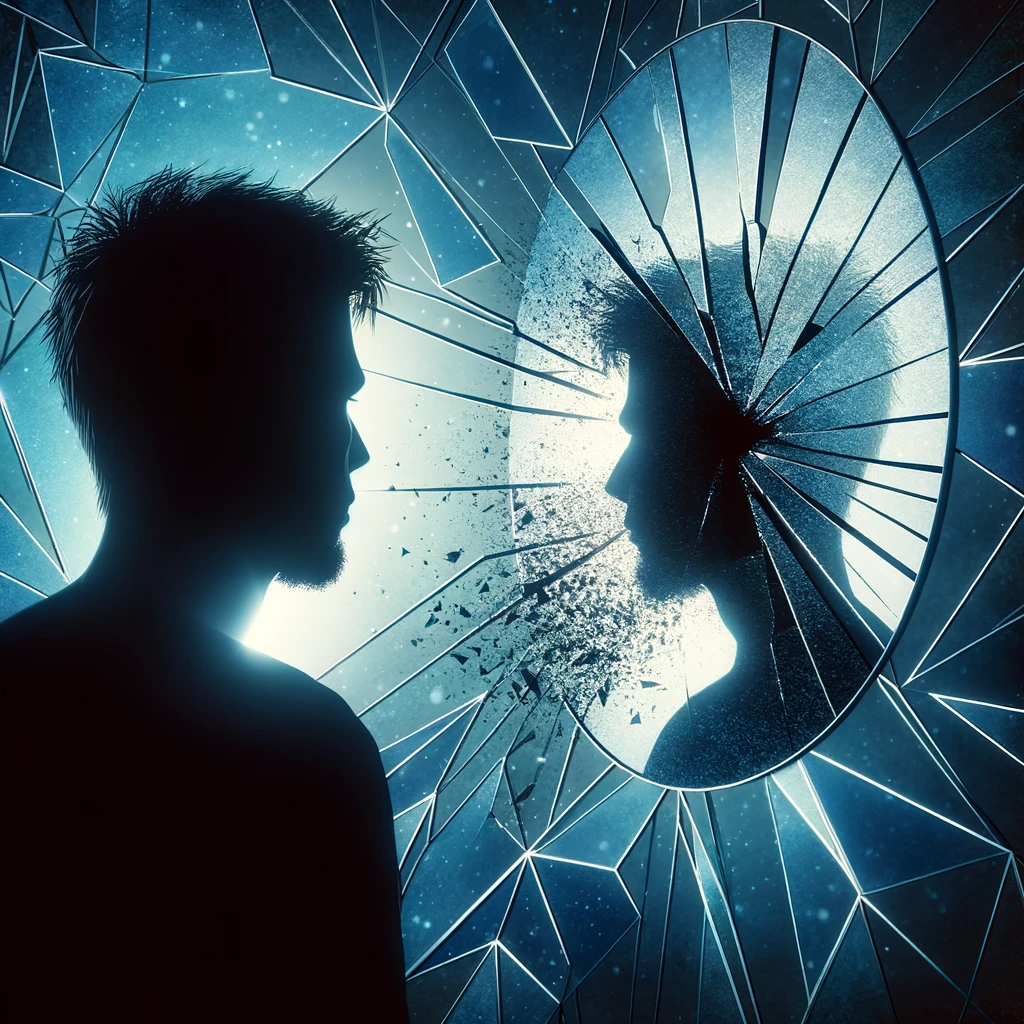Estimated reading time: 14 mins
If you’re reading this, you’re probably in search of an answer to a question many people ask themselves: ‘Why Do I Hate Myself?’ Self-hatred and self-loathing is a deeply personal and often painful emotion that many of us experience at some point in our lives. It’s a complex issue, one that doesn’t have a one-size-fits-all explanation. This article aims to explore this difficult subject in a clear, direct manner.

Why Do I Hate Myself: Understanding Self-Hatred
First, it’s important to understand what self-hatred is. It’s more than just a fleeting feeling of disappointment in ourself; it’s a deep-seated belief that we are unworthy, inadequate, or fundamentally flawed. People who ask themselves ‘Why do I hate myself?’ do so for a reason, because they believe something is wrong. This belief can stem from a variety of sources, including past experiences, societal messages, and mental health issues.
The Roots of Self-Hatred and Self-Loathing
Understanding the roots of self-hatred is crucial in addressing and overcoming it. This deep-seated emotion often stems from a complex mix of personal experiences, societal influences, and psychological factors. Let’s delve deeper into each of these contributing factors:
- Childhood Experiences: The foundation of our self-perception is often built during our early years. Children who face constant criticism, neglect, or abuse may develop a persistent belief that they are unworthy or unlovable. This can come not only from family members but also from teachers or peers. Bullying, for instance, can leave lasting scars on our self-esteem. Additionally, growing up in an environment where high expectations are set, either academically or behaviorally, can sometimes lead to feelings of inadequacy in later life, especially if these expectations are unrealistic or if failure is met with harsh judgment.
- Societal and Cultural Influences: Society plays a significant role in shaping our self-image. We are often bombarded with messages about what is considered successful, beautiful, or desirable. This constant stream of information, particularly in an age dominated by social media, can lead individuals to unfavorably compare themselves to these often unattainable standards. The pressure to conform to certain norms regarding appearance, career success, or lifestyle can be overwhelming, leading to feelings of failure and self-loathing when these standards are not met.
- Mental Health Issues: Psychological conditions like depression and anxiety can exacerbate negative self-perceptions. Depression, in particular, can lead to a distorted view of ourself, where thoughts of worthlessness and self-hatred become prevalent. Anxiety can create a constant state of worry and self-doubt, further feeding into negative self-talk. These mental health issues can create a feedback loop, where self-hatred worsens the symptoms of the condition, which in turn intensifies the feelings of self-hatred.
- Traumatic Events and Chronic Stress: Experiencing traumatic events, especially those that shake our sense of safety or self-worth, can lead to long-lasting effects on self-perception. This might include experiences like severe accidents, loss of loved ones, or exposure to violence. Similarly, prolonged exposure to stress, whether in personal or professional life, can erode self-esteem and contribute to feelings of inadequacy and self-hatred.
- Internalization of Failure and Rejection: Sometimes, the way we process failures and rejections can lead to self-hatred. Instead of viewing failures as normal parts of learning and growing, some individuals may internalize these experiences, seeing them as reflections of their core identity. This can be particularly true in environments where there is a high value placed on achievement and success.
Understanding these roots is the first step in untangling the complex web of self-hatred. It requires a compassionate and patient approach, acknowledging that these feelings didn’t emerge overnight and won’t disappear quickly either. By recognizing and addressing these underlying issues, individuals can begin the journey towards healing and self-acceptance.


Why Do I Hate Myself? The Impact of Self-Hatred and Self-Loathing
The impact of self-hatred and self-loathing is profound and multi-faceted, affecting nearly every aspect of an individual’s life. At its core, this deep-seated dislike or hatred of ourself acts like a pervasive shadow, coloring thoughts, emotions, and behaviors.
Emotional Turmoil: Self-hatred often leads to a tumultuous inner world. Those suffering may experience persistent feelings of sadness, guilt, or worthlessness. This emotional pain is not just fleeting; it can be relentless and overwhelming, making it hard to find joy or satisfaction in life.
Relationships and Social Life: Self-hatred can severely impact our relationships. It can lead to a lack of trust in others, difficulties in forming and maintaining relationships, or even cause us to push others away due to feelings of unworthiness. The belief that we are not worthy of love or respect can lead to accepting unhealthy relationships or avoiding social interactions altogether.
Mental Health: The constant barrage of negative thoughts that come with self-hatred can contribute to mental health issues like depression, anxiety, and even lead to suicidal thoughts or behaviors. It creates a vicious cycle where negative self-perception exacerbates mental health issues, which in turn, feed back into more intense self-loathing.
Physical Health: The stress and anxiety stemming from self-hatred can manifest in physical symptoms. This might include insomnia, chronic fatigue, headaches, or digestive issues. Over time, this chronic stress can contribute to more serious health problems like heart disease or a weakened immune system.
Behavior and Performance: Self-hatred can cripple our ability to perform tasks or achieve goals. It often leads to self-sabotage in both personal and professional settings. A person might avoid taking on new challenges due to a fear of failure, or they may not fulfill their potential because they believe they don’t deserve success.
Substance Abuse: In an attempt to cope with the painful feelings that self-hatred brings, some individuals may turn to alcohol, drugs, or other harmful behaviors. These can provide a temporary escape, but ultimately exacerbate the problem and lead to a cycle of dependency.
Understanding the multifaceted impact of self-hatred is crucial in recognizing the need for support and intervention. It’s not just a matter of feeling bad about ourself; it’s a pervasive issue that can affect every aspect of life, from mental and physical health to relationships and personal growth. Addressing self-hatred is vital for overall well-being and quality of life.


Why Do I Hate Myself: Breaking the Cycle
Asking yourself ‘why do I hate myself?’ over and over is not progress. You can break the cycle.
- Acknowledge Your Feelings: The first step in overcoming self-hatred is acknowledging it. This isn’t about indulging in these feelings but about recognizing their presence. Own the problem and take accountability.
- Understand the Source: Try to identify where these feelings are coming from. Is it related to past experiences, current life circumstances, or mental health issues? Understanding the root can help in addressing the problem.
- Challenge Negative Thoughts: Learn to recognize and challenge your negative thoughts. When you catch yourself thinking something like “I’m worthless,” counter it with evidence of your worth.
- Seek Support: You don’t have to deal with these feelings alone. Talk to friends, family, or a professional who can offer support and guidance.
- Practice Self-Compassion: Treat yourself with the same kindness and understanding you would offer to a friend in your situation.
- Set Realistic Goals: Setting and achieving realistic goals can boost your sense of self-worth. Start small and gradually build up.
- Focus on What You Can Control: You can’t change the past, but you can control your actions and reactions in the present.
- Engage in Activities You Enjoy: Doing things you’re good at and enjoy can improve your mood and boost your self-esteem.
Why Do I Hate Myself: Seeking Professional Help
Seeking professional help is a vital step for those grappling with persistent self-hatred. A mental health professional, like a psychologist or psychiatrist, can provide a safe space to explore and understand these feelings. They use therapeutic techniques such as Cognitive Behavioral Therapy (CBT) or Dialectical Behavior Therapy (DBT) to challenge and change negative thought patterns.
Additionally, they can help uncover any underlying issues such as past trauma or mental health disorders contributing to these feelings. Therapy is not a sign of weakness but a courageous step towards healing and self-discovery. It’s about equipping ourself with tools and strategies to foster a healthier self-image and improve overall mental well-being.
But they’re not ‘miracle workers’ and abdicating the problem isn’t an option. When seeking professional help, you must also be prepared to undergo facing into the challenges and be determined to break through to the other side.
The Role of Medication in Managing Self-Hatred
When discussing the role of medication in managing self-hatred, it’s crucial to understand that while medication can be an effective tool, it is typically part of a broader treatment plan. Medications, particularly those used to treat depression and anxiety, can help manage symptoms that often accompany or exacerbate feelings of self-hatred.
Pros of Medication:
- Symptom Management: Medications can provide significant relief from symptoms of depression and anxiety, which can create a more stable emotional baseline and reduce the intensity of negative self-thoughts.
- Improved Functionality: By alleviating some of the symptoms, medication can make it easier for individuals to engage in daily activities, pursue therapy effectively, and practice self-help strategies.
- Biochemical Support: Certain mental health issues are associated with biochemical imbalances in the brain. Medications can help to correct these imbalances, providing a physiological support to emotional well-being.
- Access to Therapy: For some individuals, the severity of their symptoms can be a barrier to therapy. Medication can reduce this barrier, making therapeutic interventions more accessible and effective.
Cons of Medication:
- Side Effects: Many psychiatric medications come with side effects, which can range from mild to severe and may include weight gain, sleep disturbances, or sexual dysfunction. These side effects can sometimes exacerbate feelings of poor self-worth or discomfort.
- Dependency and Withdrawal: There’s a potential risk of dependency, particularly with certain types of medication. Withdrawal symptoms can also occur if the medication is stopped abruptly.
- Not a Cure: Medication does not cure the underlying causes of self-hatred. It can manage symptoms but should be used in conjunction with therapy and other treatments for a more holistic approach.
- Variability in Effectiveness: Medications do not work the same for everyone. It can take time to find the right medication and dosage, and for some, it may not be effective at all.
- Stigma: Unfortunately, there’s still a stigma attached to taking psychiatric medication, which can lead to feelings of shame or failure in individuals who need them.
The decision to use medication should be made in consultation with a healthcare professional, considering the individual’s specific circumstances, symptoms, and medical history. It’s important to weigh the potential benefits against the risks and side effects. Medication can be a valuable tool in managing aspects of mental health that feed into self-hatred, but it’s most effective when combined with other forms of therapy and self-care practices. The journey towards overcoming self-hatred is multifaceted, and medication can play a crucial role in this complex process.


Why Do I Hate Myself? Self-Help Strategies
The fact that you’re asking yourself ‘why do I hate myself?’ is a start to self-help. But there is much more you can do. Self-help strategies play a crucial role in managing and overcoming feelings of self-hatred. Here’s a more detailed look at some effective approaches:
- Mindfulness and Meditation: These practices help you cultivate a state of awareness and presence in the moment. Mindfulness teaches you to observe your thoughts and feelings without judgment, which can be particularly beneficial in managing negative self-talk. Meditation, even if practiced for just a few minutes a day, can significantly reduce stress and improve your mood.
- Journaling: This is more than just writing down your thoughts. It’s a process of introspection and self-discovery. Through journaling, you can track your thoughts and feelings, identify patterns, and work through challenging emotions. It’s also a space to list your accomplishments and things you are grateful for, which can help shift your focus from negative to positive aspects of your life.
- Physical Activity: Regular exercise has been proven to have a profound impact on mental health. It releases endorphins, which are natural mood lifters. Exercise doesn’t have to be intense or time-consuming; even a daily walk can make a significant difference.
- Healthy Lifestyle Choices: Eating a balanced diet, maintaining a regular sleep schedule, and avoiding substances like alcohol and drugs are essential for mental well-being. These habits help regulate your mood, improve your energy levels, and enhance your overall health.
- Learning New Skills: Engaging in new hobbies or learning new skills can be incredibly empowering. It provides a sense of accomplishment and helps to build self-confidence. Whether it’s learning a musical instrument, a new language, or a craft, these activities provide a positive focus and a break from negative thoughts.
- Social Connection: Building and maintaining healthy relationships can provide emotional support and reduce feelings of isolation. Engaging in community activities, joining clubs or groups with similar interests, or simply spending time with loved ones can have a significant positive impact on your self-esteem.
These self-help strategies are tools to help you build resilience against negative self-perceptions. They encourage a healthier mental state, fostering a journey from self-criticism to self-acceptance and self-love. Remember, the most important step in this journey is to start, and to keep going, even when it gets tough.


The Power of Positive Affirmations
Asking ‘why do I hate myself?’ is a powerful question, but positive affirmations are a more powerful tool in combating self-hatred. They involve consciously choosing words that will help shift negative thought patterns towards more positive, self-affirming beliefs. This practice might feel forced or unnatural at first, especially if you’re used to a stream of self-critical thoughts. However, with consistency, affirmations can gradually reshape your mindset.
The key to effective affirmations is to make them believable and relevant to your life. For instance, instead of a broad statement like “I am the best,” opt for something more specific and personal, such as “I am capable of overcoming my challenges.” Affirmations should be in the present tense and positively framed, focusing on what you want to feel or achieve, not what you wish to avoid.
Integrating affirmations into your daily routine can be simple. You might repeat them every morning, write them in a journal, or post them in places where you’ll see them throughout the day. This practice serves as a reminder of your worth and potential, counteracting the negative self-talk that fuels self-hatred. Over time, these affirmations can become a natural part of your thought process, leading to a more positive self-image and a healthier mindset.


Understanding the Journey
Embarking on a journey to overcome self-hatred is a deeply personal and often challenging process. It’s crucial to understand that this journey is rarely straightforward or quick. There will be moments of progress mixed with times of setback, and it’s essential to approach each step with patience and resilience.
One of the key aspects of this journey is self-discovery. ‘Why do I hate myself’ is just the start of this discovery. As you delve into the roots of your self-hatred, you may uncover painful memories or uncomfortable truths about yourself and your past. This process, while difficult, is crucial for healing and moving forward. It involves not just understanding where these feelings come from, but also learning how to process and let go of them.
Another important element is the cultivation of self-compassion. This means learning to treat yourself with the same kindness and understanding that you would offer to a good friend. It involves recognizing that perfection is an unattainable standard and that making mistakes is a part of being human.
Additionally, this journey is about building resilience. You’ll learn how to bounce back from negative thoughts and develop strategies to cope with challenging emotions. This resilience is key to maintaining your progress and continuing to move forward, even when the road gets tough.
Finally, remember that the journey to overcoming self-hatred is unique for everyone. No two people will get the same answer or solution to ‘why do I hate myself?’ What works for one person may not work for another. It’s about finding what resonates with you, whether it’s therapy, meditation, journaling, or a combination of strategies. The path may be long and winding, but it leads to a place of greater self-acceptance and peace.


Why Do I Hate Myself: Conclusion
Self-hatred is a profound and challenging emotion, but it’s not insurmountable. With the right tools, support, and mindset, it’s possible to move from self-hatred to self-acceptance. Remember, the way we talk to ourselves matters. Cultivating a kinder, more compassionate inner dialogue can make a significant difference in how we feel about ourselves and how we navigate our lives. Next time you ask yourself ‘why do I hate myself?’, hopefully I’ve put you on track to answer it.

This article really resonated with me. I’ve been asking myself ‘Why do I hate myself?’ for as long as I can remember. It’s comforting to know that there are others out there who feel the same way and that there are ways to break the cycle. I especially liked the suggestion of challenging negative thoughts. I’m determined to try and overcome these feelings of self-hatred. But where best to start?
Thanks Barry and I am glad this post is helpful. Where to start? Two things to do: 1) understand that this is common, and not unique to yourself, and therefore be kind on yourself. 2) as you said yourself – challenge negative thoughts. When one pops into your head, don’t accept it but ask yourself what triggered it. Was the trigger something you did, somebody else did, or just a naturally occurring accident? Then bat it away.